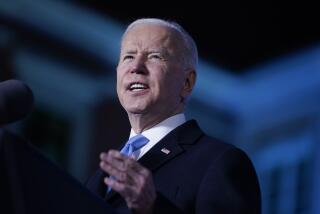Bush Expected to Propose New Tax Break for Savings
- Share via
WASHINGTON — President Bush is expected to propose new tax incentives for savings to encourage Americans to set aside more money for the future, Administration officials said Friday.
Treasury Secretary Nicholas F. Brady announced several months ago that he was looking at ways to increase incentives for savings and investment, but few details of the Administration approach have emerged until now. Several options are under consideration, aides said, and no decision has been made about specifics.
Nonetheless, Bush is expected to include a savings proposal in the budget that he will submit to Congress on Jan. 22.
The leading proposal, presented by Treasury Department officials at a meeting this week of the Cabinet-level Economic Policy Council, would allow families to set aside up to $5,000 a year in a special account in which interest or dividends would be exempt from taxation if the money was not touched for at least 10 years.
The Administration plan was disclosed Friday in the Wall Street Journal.
But the proposal could run into stiff competition from Democratic lawmakers, who want to expand individual retirement accounts and fear that the Bush approach would be a significant drain on the Treasury by the end of the decade.
The Administration approach contains several features that would make it markedly different from IRAs. It would not provide an up-front tax deduction, as IRAs do, but would allow individuals to avoid taxes entirely on their eligible savings.
“We’re not going to let the Democrats in Congress take over the savings issue,” one Administration official said. “This will look good as a companion to our capital gains plan.” The Administration wants to cut the capital gains tax.
It wants to encourage savings to make a greater pool of funds available for the type of capital investments that will lead to a higher standard of living in the future.
Affluent Americans would gain the most from the new proposal because they are more likely to have enough extra money to set aside for savings and because they do not receive much benefit under the current rules for IRAs.
Many economists doubt that tax incentives will increase savings significantly because the incentives often do little more than encourage individuals to shift funds from ordinary savings accounts to tax-favored ones.
Under current law, taxpayers may not withdraw funds from their IRA accounts without penalty until they reach the age of 59 1/2. The new savings vehicle, dubbed family savings accounts, would allow withdrawals after only 10 years and is likely to allow penalty-free withdrawals of funds used to pay for college expenses or to purchase a first home.
Also under current law, individuals or married couples covered by pension plans must fall below certain income levels to be eligible for tax deductions on IRA contributions. To encourage the largest possible increase in savings, there would be no income restrictions on the family savings accounts, aides said.
For taxpayers, the most attractive feature of the proposal would be the possibility of avoiding taxes entirely, rather than simply deferring them, as in an IRA. Withdrawals from individual retirement accounts are taxed as ordinary income, but the earnings on the new account would escape taxation.
From the point of view of Administration officials, the new proposal is particularly attractive because, by not offering an immediate tax write-off, it would have little impact on the federal budget in the early years. But the new savings vehicle could lead to a sharp cut in tax revenues in future years.
The use of IRAs was sharply curtailed as part of the sweeping overall tax revision enacted in 1986, but Congress this year considered several proposals to revive them and is expected to return to the issue in 1990.
More to Read
Get the L.A. Times Politics newsletter
Deeply reported insights into legislation, politics and policy from Sacramento, Washington and beyond. In your inbox twice per week.
You may occasionally receive promotional content from the Los Angeles Times.









